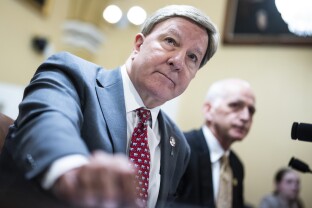A single line targeting transgender youth in the proposed compromise defense budget will put Democrats’ records supporting the LGBTQ+ community to the test.
In what Speaker Mike Johnson called an “end [to] the radical woke ideology being imposed on our military,” the National Defense Authorization Act, which dropped Saturday night, includes a provision “permanently banning transgender medical treatment for minors,” he said in a statement.
“Medical interventions for the treatment of gender dysphoria that could result in sterilization may not be provided to a child under the age of 18,” the bill text reads.
“It’s an issue we debated extensively on committee,” Sen. Mark Kelly told NOTUS. “We’ve got a problem with it, but that’s the bill. That’s what’s been negotiated, and everybody’s going to have to make their own decision on whether they can support it.”
Rep. Adam Smith, the top Democrat on the House Armed Services committee, called on Johnson to strike the line from what was otherwise a consensus piece of legislation, which includes pay increases for troops and funding for modernization.
Smith told Politico that he’s still undecided whether he’ll vote in favor of the NDAA because of this provision, though he noted that negotiations had “watered it down considerably” from previous drafts. Earlier this year, Republicans passed a version of the NDAA that included amendments prohibiting funds for increased abortion access, undoing climate change provisions and denying health care for transgender troops.
With the bill on track for the floor, this provision would make Democrats have to choose between passing the defense budget and taking a stand against anti-transgender policies.
Even so, Kelly was confident that the bill would pass and he wasn’t alone. Sen. Tim Kaine, who hadn’t read the full text of the bill, didn’t think it would slow down the process either.
“I mean, I’m sure I’m gonna look at it and think, ‘Man, I voted against that. I wish it wasn’t in,’” Kaine said, remarking that it wasn’t the only change from what was drawn up in the Senate earlier this year. “But, you know, we need a defense bill.”
Last month, NOTUS reported on an effort to strip “culture war” provisions out of the final text.
Now, this single line prohibiting Tricare from covering gender-affirming care for minors has become a rallying cry for Republicans.
Talking to NOTUS, Sen. Roger Wicker, the ranking member of the Senate Armed Service committee, said he hadn’t been advised that the provision would cause any Democrats in the Senate to pull away from the NDAA. “I’ve heard of speculation about some House members, but no, I haven’t heard anything,” he said.
“I am proud of much of the NDAA,” he said in a statement, highlighting that negotiators “protected children against dangerous medical treatment.”
“We cannot risk our national security and the entire United States military over the left’s absurd belief that the DOD should be paying for minors to transition their gender,” Rep. Austin Scott told NOTUS in a statement.
That said, it remains an open question whether Republican hardliners, who saw many more provisions cut out of this proposed bill text, will support moving ahead — particularly if Democrats stand united against it.
One sign this defense budget will see a floor vote came mid-Monday when Rep. Chip Roy, who sits on the House Rules committee, said he supports moving the NDAA forward.
“I am working with the speaker’s office on how we move forward on this,” Roy said, according to Punchbowl News. “There’s some general agreement that the speaker has been fighting for some very specific wins that I think we ought to move forward and move for the will of the conference and have a rule.”
That would put more of the onus on Democrats in a floor vote. As for the NDAA’s final passage, Republicans acknowledged this provision may ultimately get left out once the bill heads to the Senate.
“It was pretty bipartisan coming out of committee,” Rep. Ronny Jackson told NOTUS, “But, yeah, the Senate always waters it down.”
—
John T. Seward is a NOTUS reporter and an Allbritton Journalism Institute fellow.
Sign in
Log into your free account with your email. Don’t have one?
Check your email for a one-time code.
We sent a 4-digit code to . Enter the pin to confirm your account.
New code will be available in 1:00
Let’s try this again.
We encountered an error with the passcode sent to . Please reenter your email.


